Jeremy Corbyn on 52 years of fighting for queer rights, why LGBT voters can trust him and, of course, Madonna or Cher
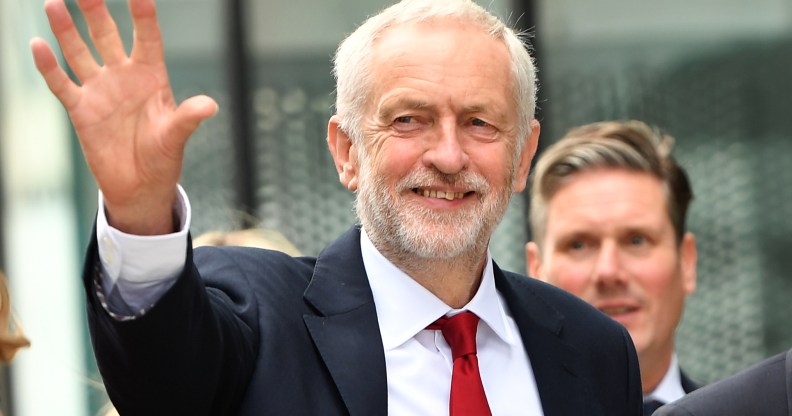
Labour Party leader Jeremy Corbyn waves as he arrives during the Labour Party conference on September 26, 2018. (Anthony Devlin/Getty Images)
Jeremy Corbyn is a lot of things. He’s the leader of the Labour Party. He’s the man who wants to form the next government.
But he’s also a man who’s championed and fought for LGBT+ equality for 52 years. And he’s also a man who, as we discovered, prefers Cher over Madonna.
His critics will also tell you that he’s a man who received a reported £20,000 for a series of appearances on Press TV in Iran, a country where being gay is punishable by death, between 2009 and 2012.
This is something PinkNews has held Jeremy Corbyn to account over in the past.
In 2016, he told us that his appearances enabled him to “raise a number of human-rights issues” and that the money he pocketed was funnelled back into his constituency office.
“Everywhere I’ve ever travelled, I’ve always raised the issue of human rights,” Jeremy Corbyn explained to PinkNews back in 2016.
“I used the opportunities to address the issues of the Western relationship with the whole region, address the issues of Iraq, and also address issues of human rights – even in a very difficult atmosphere when you’re dealing with countries and governments that clearly don’t have the same human-rights agenda that I do.”
It’s something that, in this interview with Jeremy Corbyn ahead of the most important general election in a generation, we questioned the Labour leader about again, as we did with his historic connections to Palestinian militant organisation Hamas, asking whether or not an LGBT+ voter can really trust him.
As we did with his absence from the vote to repeal Section 28, another rare blemish on his almost spotless record of fighting for LGBT+ rights.
But, while they are valid criticisms of Jeremy Corbyn, there’s still a lot more that we think is important to know about someone who wants to pick up the keys to Number 10 Downing Street and lead our country for the next five years.
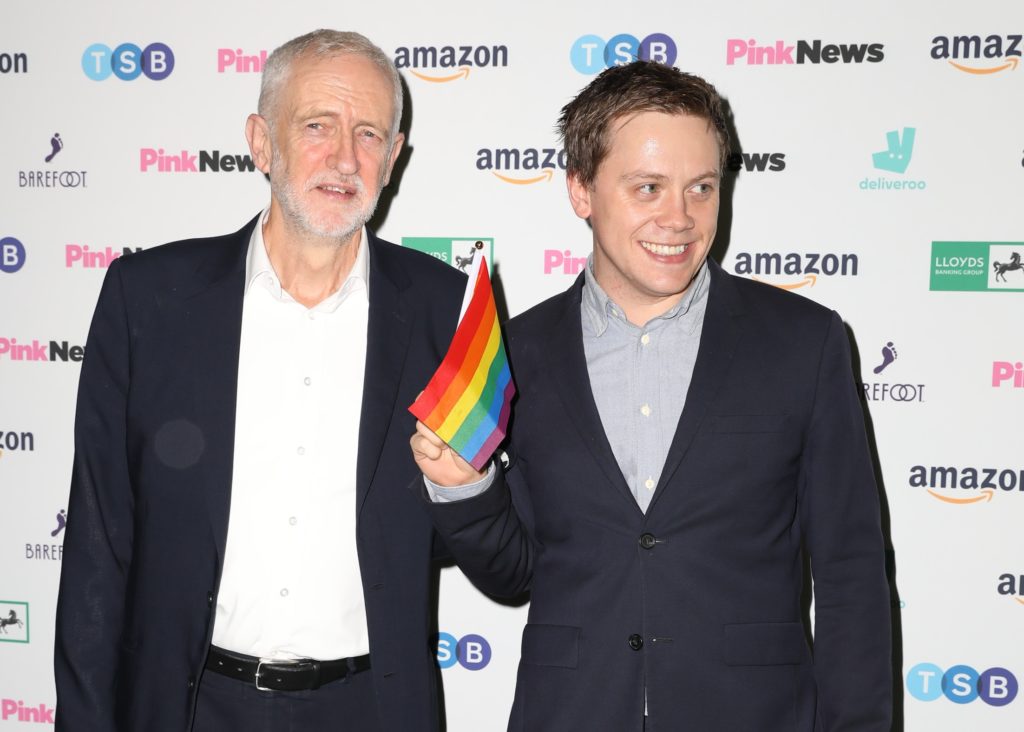
Jeremy Corbyn and Owen Jones at the 2019 PinkNews Awards (Paul Grace)
We think it’s important to know who his gay icon is; we think it’s important to hear his message of solidarity to our transgender and non-binary siblings amid the worst levels of transphobia the community has ever seen; and we think it’s important to know just how important the fight for LGBT+ equality and queer liberation is for Jeremy Corbyn, as we would anyone aspiring to be prime minister of the United Kingdom.
Why? Because it’s your vote that could decide the outcome of this election.
And, considering that the current occupant of Number 10 Downing Street repeatedly refuses to apologise for calling gay men “tank-topped bum boys”, and previous party leaders have refused to say whether or not gay sex is a sin, while others think being homophobic is defendable on the grounds of free speech, we needed to find out if the man who could potentially take over from Boris Johnson in the wake of this election is someone who’s going to fight on our side.
But while it’s down to us to ask these questions of the Labour leader, after that, it’s down to you to ask yourself a question based on the answers he gives. Is Jeremy Corbyn really an LGBT+ ally?
PinkNews: When did LGBT+ rights first become such an integral part of your political agenda?
I first began to learn about that in 1967 when I was in school.
I was in a boy’s grammar school in Shropshire and I was already quite an active member of the Labour Party.
The 1967 Labour government supported private members legislation to start to reform sexual-offences legislation after the Wolfenden Report, and introduce the first legislation that introduced gay rights in some form.
It was a very limited legislation at the time, but I remember the horrible backlash against it. It was brutal.
A lot of anti-gay stuff, a lot of homophobia around and, at school, I defended the legislation.
I have to say, I was on a journey. I didn’t fully understand it all. I just thought there was a basic human right involved. And, of course, I was a minority of one in my school class.
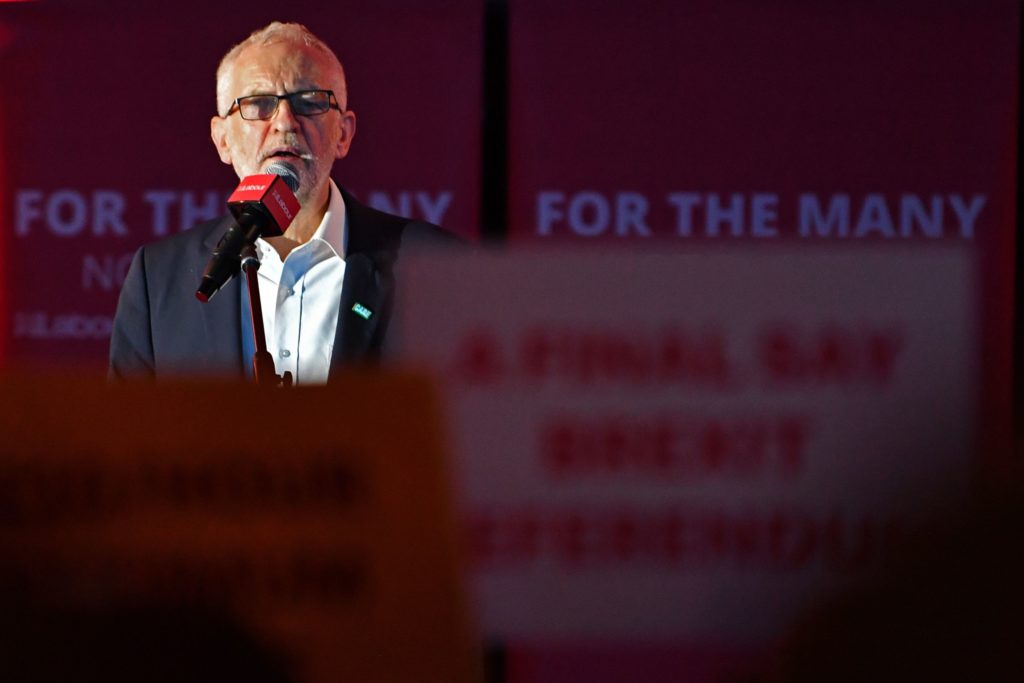
Britain’s main opposition Labour Party leader Jeremy Corbyn. (PAUL ELLIS/AFP via Getty Images)
I then went to live in the Caribbean as a VSO and there was a lot of legislation in Jamaica that made it a criminal offence to have a homosexual relationship.
There were quite openly a lot of homosexual relationships going on, which I found interesting even at that time, in 1960s Jamaica, so I began to understand things there quite a lot.
I was back in Britain a couple of years later, then became very involved in British politics and very involved in a whole lot of human rights, including [LGBT+ rights].
So your first experience of homophobia would have been at school?
Yes, absolutely.
It was sort of like routine abuse. They wouldn’t use the word ‘gay’, they would use the word ‘queer’ and so on, and it was just a term of abuse.
Thankfully, we’ve reclaimed that word now.
I know, it’s a strange thing the way words go full circle. Because at that time, it was just abusive.
It was meant to be abusive, anyway.
What’s your earliest memory of a Pride parade that you attended?
The 1970s, when I had become a councillor in Haringey and the early Pride parades were on then.
I was also involved as a local councillor defending a group of people who had set up the North London gay centre in a house in Finsbury Park. They were squatters.
It was also a time of the rise of the National Front and the far-right fascists all around this part of London. The National Front and its supporters tried to break up this place and prevent this community from living there.
They were defended by a group of Irish building workers from the pub next door who didn’t like or care for fascists on the street, and the North London gay centre went on for a while.
And that was in the ward that I represented as a local councillor, from 1974 onwards, which was the area then called South Hornsey, which is just around Finsbury Park.
Fast-forward a decade from there. You’re now an MP at the height of the AIDS crisis. When did you first realise it was a national epidemic and people were dying?
When The Sun started running a story calling it the ‘gay plague’.
When they started condemning anyone who suffered from HIV or AIDS as enemies of the people and started denigrating those.
EastEnders, I remember, ran a whole character on this; of somebody who was suffering from HIV.
One of the actresses who was playing the part of somebody suffering HIV, her child attended the same primary school as my kids. Some of the parents said: ‘Don’t go near him, he’s got AIDS.’
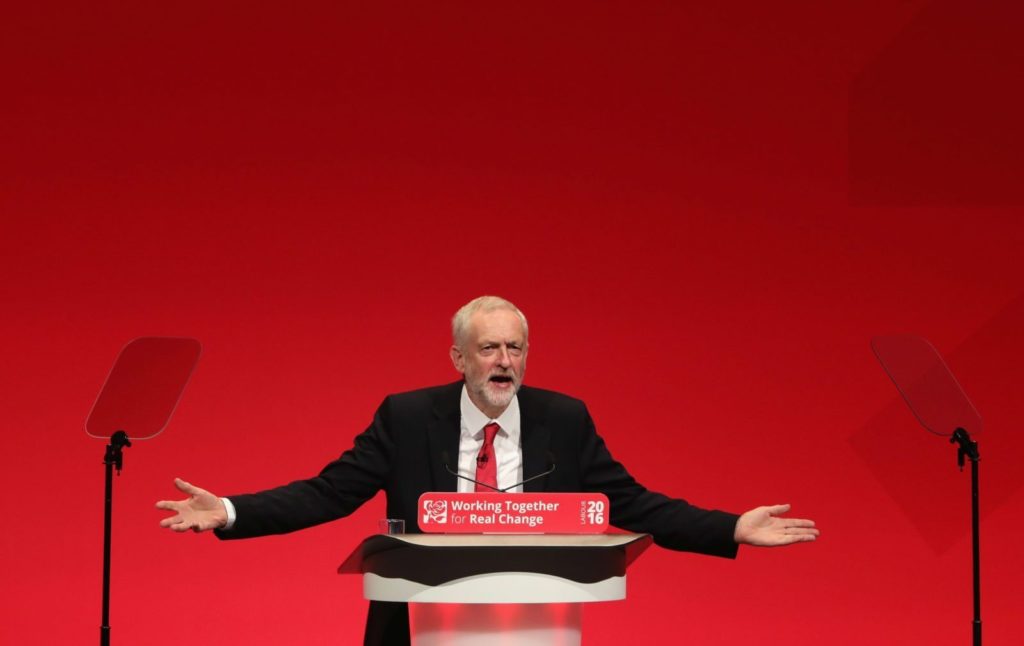
Jeremy Corbyn (Christopher Furlong/Getty Images)
Now, hang on. It was a TV series.
But in any event, obviously, you treat people with AIDS and HIV as fellow citizens, you recognise the condition and support them. But the brutality and abuse that was suffered damaged a lot of people’s lives.
It led to some horrible incidents of violence against people and set back the cause of supporting people with HIV and the development of antiretroviral drugs.
But the brutality and abuse that was suffered damaged a lot of people’s lives. It led to some horrible incidents of violence against people.
Absolutely outrageous what was going on, and I do remember all that very, very well.
It was also at that time when Chris Smith became the first male MP to speak out as someone who was openly gay.
But, of course, Maureen Colquhoun had come out as a lesbian many years before – in 1974, I think. And Chris did that – my neighbouring MP, a good friend of mine.
He got a lot of support but a great deal of abuse at the same time. He was defending a majority of 300 from the 1983 election and everything possible was thrown at him in the 1987 election, but he won – I think, from memory, by 800 votes.
And my constituency, being the neighbouring one, sent a lot of people to Islington South to help him and indeed I spent part of polling day itself getting Labour voters out to support Chris at that time.
It was very, very important to make that statement, and he got re-elected and that began to change the whole mood.
Who would you say is your own personal gay icon?
Freddie Mercury. The music! The zaniness! The joie de vivre! Yes, amazing.
And who would you say is your trans hero?
Probably April Ashley, actually, because of the way she was so abused, and the way she went through all of that and came out of it as a great campaigner.
You said you were a Freddie Mercury fan. Do you have a personal gay anthem? One you can let your hair down to?
Anything sung by Freddie Mercury! Queen! Freddie Mercury! Fantastic!
Can we be reassured that the Gender Recognition Act will be reformed and fixed to ensure the safety, protection and validation of trans and non-binary people in the UK?
Can you promise us that this will be put into action, rather than simply saying you will, when you become prime minister?
Yes, I can definitely promise that, because this is long overdue. We will reform the Gender Recognition Act to include self-identification for trans people – and we will make sure the voices of non-binary people are finally heard in our review of the GRA consultation.
Trans people will no longer have to endure invasive, dehumanising and lengthy processes in order to have their gender recognised. And we’ll also amend the Equality Act 2010.
We need to remove the outdated language in there, and we’re going to ensure there are proper protections for trans people against discrimination.
And with the rise in transphobia in the media and the surge in transphobic hate crime in the last few years, do you have a message for any trans voters reading this?
Listen, your rights have got to be protected just like everybody else’s human rights.
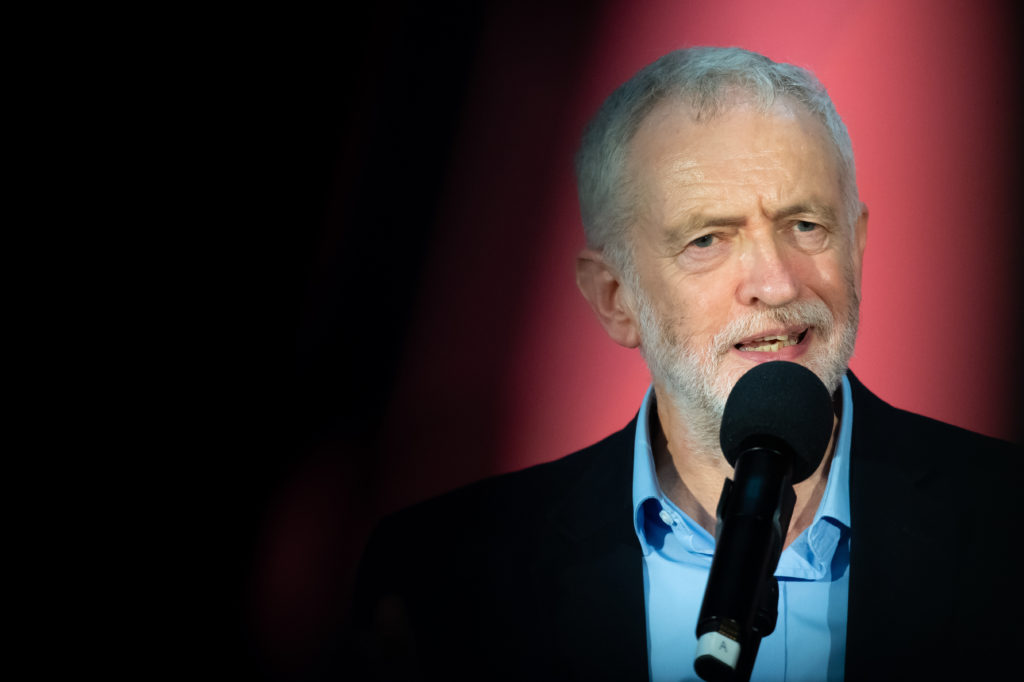
Jeremy Corbyn speaks to the audience at the Patti Pavilion on December 7, 2019 in Swansea, Wales. (Matthew Horwood/Getty Images)
I want to lead a society that is respectful of people, respectful of what they are, respectful of their views and we end abuse, discrimination and the nastiness that exists in society.
I also want to lead a government that internationally will work for rights around the world because of the criminalisation of gay people in Uganda, for example, but there are other countries as well, which is absolutely appalling.
I want to lead a government that internationally will work for rights around the world because of the criminalisation of gay people in Uganda, for example, but there are other countries as well, which is absolutely appalling.
When people come to me as a constituency MP, who want the right to remain in Britain for their own safety, because if they’re moved back they will be in extreme danger – either from legal persecution, because that can happen, or community persecution, which does happen – I think we have got to speak out much more strongly.
On the world stage, through the UN and also through the Commonwealth, I have already raised these issues with the Commonwealth secretariat.
I want to be leading a government that will be a force for pressure around the world, to ensure that everything that’s in the 1948 Convention of Human Rights is adhered to.
You were absent from the vote to repeal Section 28. Can you explain why?
I voted against the introduction of Section 28 when it was first introduced, and I have always opposed it and campaigned for its repeal. I’m very proud that Labour repealed that dreadful piece of legislation in the final vote.
You frequently call yourself an LGBT+ ally, yet you’ve associated yourself with many homophobic entities – the Iranian regime, Hamas, Hezbollah and multiple preachers. How can LGBT+ people trust you?
I completely condemn all homophobic and anti-LGBT+ organisations, and I’ve always done so wherever I’ve been in the world.
For many years I’ve campaigned on a wide range of international issues – including for the rights of gays and lesbians in Uganda.
I have always stood with LGBT+ allies and campaigned for their rights, and since I became an MP I’ve always voted in favour of LGBT+ rights: adoption rights, civil partnerships, service in the armed forces, fertility treatments, gender recognition, an equal age of consent and equal marriage.
I completely condemn all homophobic and anti-LGBT+ organisations, and I’ve always done so wherever I’ve been in the world.
Do you think the UK would accept an openly LGBT+ prime minister?
Yes, I do actually. I do.
I think we’ve come such a long way, I think [the public] would.
Indeed my local authority, Islington, when the 1983 election resulted in Labour gaining control from the Social Democrat Party (SDP), set up a lesbian and gay committee on the council with openly gay mayor Bob Crustman and Chris Smith, the MP who had come out as well.
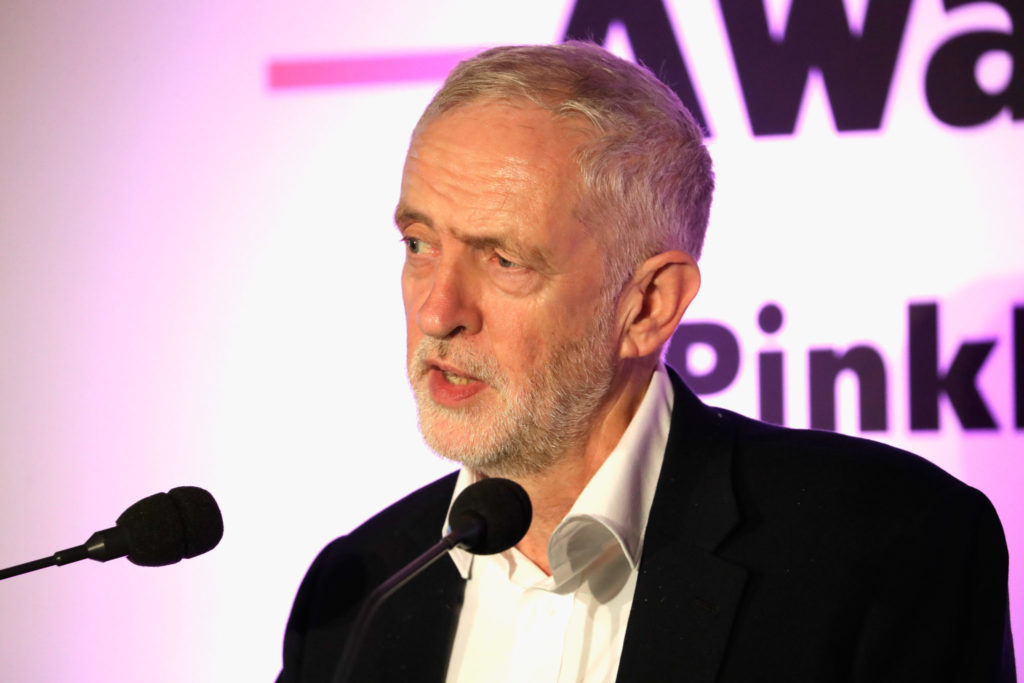
Labour Party Leader Jeremy Corbyn speaks on stage at the PinkNews Awards 2017. (John Phillips/Getty Images)
We got a lot of criticism and a lot of attacks at the time, but it sort of melted away.
So I think, yes, the country absolutely would and I would be very happy with that.
If a schoolchild calls their gay classmate a ‘tank-topped bum boy’, what do you think the punishment should be?
Often education is a more effective response to ignorance than punishment. So when I hear something like that, whether it’s from a child, or a childish prime minister, I tell them that language like that really harms people.
It puts people in danger. It hurts your gay classmate, for whom positive images and endorsements of gay role models would be helpful.
So it’s important that teachers ensure bullies and name callers face up to the harm they cause, apologise and genuinely make amends and learn, to ensure they never repeat this hurt and offence again.
When was the first time somebody opened up about their sexuality and came out to you?
Actually, some people in Jamaica at that time, as well as later on when I became the agent for the Hornsey Labour Party.
Lots of people – in all political parties, probably, but obviously I only know of the Labour Party – become a bit of a family, and I remember a young member of the party had come to tell me that he wanted to come out and what did I think about it.
On one level, I thought it was quite a strange question, but I thought, actually, I was quite touched and quite honoured that he came to talk to me about it.
I said, yes, if that’s what you want to do, of course and we’ll support you.
Right, possibly the most divisive question you’ll get on this election campaign.
Divisive question?
Yes. The most divisive question. People are split right down the middle on this one. Madonna or Cher?
Cher!
I like the music, but also the way in which – and for those of us who just enjoy the music – it wasn’t obvious just how abominably she was treated by Sonny.
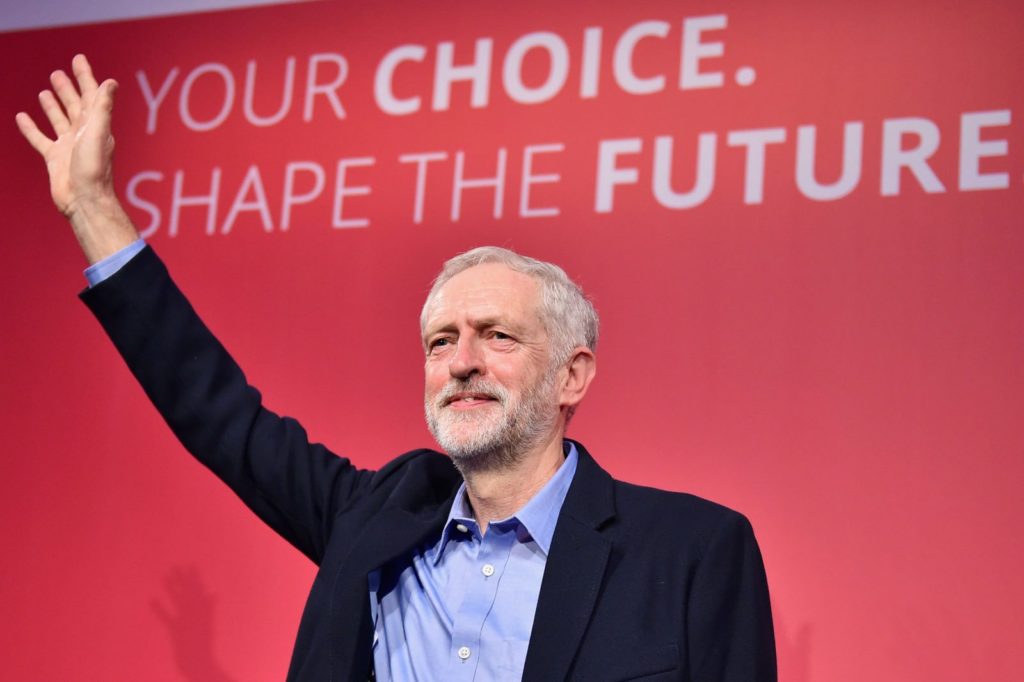
Jeremy Corbyn (Jeff J Mitchell/Getty Images)
It was absolutely disgusting. And strong women who come out of a horrible relationship and then become even stronger themselves… I think she’s amazing.
In the same way I think Tina Turner is quite amazing.
I didn’t know at the time how abominably she was treated by the people producing her music and the way Ike was treating her but, again, what an amazingly strong woman. Yeah, I admire them.
I admire Cher and Tina Turner. What amazingly strong women.
If you could give the LGBT+ community a gift this Christmas, what would it be?
A Labour government.
With that in mind, what do you think is the Labour party’s proudest moment on the issue of LGBT+ equality and queer rights?
Section 28 was a damaging, homophobic Thatcherite Conservative policy, which made it illegal for any LGBT+ issues to be ‘promoted’ in schools and local government.
The damage it caused to LGBT+ people was monumental at the time and can still be felt across the community today.
I was so proud when Labour repealed it in 2003 – just like we did when we decriminalised homosexuality in 1967.
Over several years of Labour government, we saw the greatest advancement of LGBT+ legal rights in our history. But for me that day, that particular reform, was totemic in Labour’s contribution to the LGBT+ struggle.
I really hope that under the next Labour government, we’re going to have more of those days.
And finally, why should an LGBT+ voter check the ballot box for Labour on 12 December?
Because we will guarantee rights in our society, because we will make sure we don’t go down horrible roads we’ve been down in the past.
And you’ll get a government that’s determined to support, defend and respect all communities.
And I’m determined to be that government.
A government that will work for the LGBT+ community to guarantee protections and rights and, on the world stage, promote those rights.

